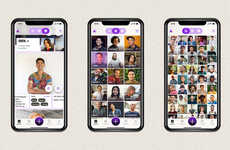
eHarmony Required to Match Same-Sex Couples
Jennifer Astle — November 22, 2008 — Social Good
References: online.wsj & valleywag
In the aftermath of Proposition 8, I am pleased to announce that the gay community has made one small step forward in civil rights and breaking down the barriers of heternormative dating and marriage. How? They sued dating site eHarmony for refusing to match same-sex couples.
eHarmony lost the case; they are now required to cater to gay couples and were also hit with a $55,000 fine.
Although it may seem a minor victory, the eHarmony case demonstrates the increasing willingness for courts to judge cases in favor of the gay community, particularly when it comes to the legal status of their relationships.
eHarmony lost the case; they are now required to cater to gay couples and were also hit with a $55,000 fine.
Although it may seem a minor victory, the eHarmony case demonstrates the increasing willingness for courts to judge cases in favor of the gay community, particularly when it comes to the legal status of their relationships.
Trend Themes
1. LGBTQ Inclusivity in Online Dating - The demand for LGBTQ-inclusivity in dating platforms creates opportunities to innovate and develop new, inclusive features and services.
2. Legal Recognition of Same-sex Relationships - The increasing willingness for courts to judge cases in favor of the legal recognition of same-sex relationships creates opportunities for innovating legal services and counseling.
3. Social and Political Activism in the Digital Age - The use of technology and social media in social and political activism creates opportunities to develop new tools and platforms for activism.
Industry Implications
1. Online Dating - The eHarmony case emphasizes the importance of creating inclusive dating platforms for the LGBTQ community, providing opportunities to develop innovative online dating services and features.
2. Legal Services - The legal recognition of same-sex relationships highlights the need for innovative legal services and counseling that cater to the needs of the LGBTQ community.
3. Social Media - The use of social media in LGBTQ activism creates opportunities to develop new tools and platforms that support social and political activism on these platforms.
2.3
Score
Popularity
Activity
Freshness























